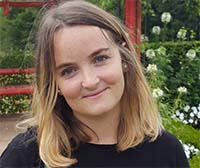
Marion Lemoine
Evolutionäre Ökologie
Institut für Organismische und Molekulare Evolutionsbiologie
Hanns-Dieter-Hüsch-Weg 15
55128 Mainz
phone: +49 - (0) 6131 - 39 26108
fax: +49 - (0) 6131 - 39 23731
Research interest:
Impact of the microbiome on the viable temperature range of Drosophila
Mutualistic interactions have been best described as defensive and nutritional advantages for the host, enabling insects to exploit more diverse ecological niches. Less described symbioses are the one enabling insect to adapt to abiotic conditions which could be crucial for ectotherm animals. Increased host survival from heat shock by symbiont metabolism in whiteflies or aphids have been described but clear cases in which symbionts adaptively extend the viable temperature range of insects, in particular by providing tolerance to lower temperatures, remain scarce.
If laboratory-reared Drosophila melanogaster microbiota is reduced to members of the genera Lactobacillus (Firmicutes) and Acetobacter (Proteobacteria), wild populations show more complex communities dominated including a large proportion of yeasts. Since, both microbial communities are almost never overlapping, fruit flies microbiota is characterized by transient communities acquired thought its environment (e.g food intake). Fly microbiota has been implicated in a multitude of effects on their host, e.g. by affecting development, nutrition and metabolism, defense, morphology, immunity, and gene coexpression networks. More particularly, fly associated microbes reduce lipid/carbohydrate accumulation and storage, provide essential sterol precursors and long chain/unsaturated fatty acids.
In Drosophila melanogaster, cold tolerance is mainly achieved by maintaining cell membrane fluidity, which ensure homeostasis, cell integrity and functioning. Since, adjusting lipid, sterol and protein cell membrane composition, is key to cold tolerance for fruit flies and was shown to depend on nutrient intake, we hypothesize that transient microbial mutualists acquired from food permit low-temperature acclimation.
Using conventional and axenic flies, we aim to show that microbes are modifying Drosophila melanogaster survival from cold shock. Combining manipulative experiment, generating gnotobiotic flies, with performance assays and chemical analyses as well as high- throughput microbiota profiling we aim to identify microbial candidates and understand the mechanistic basis of such interaction.
